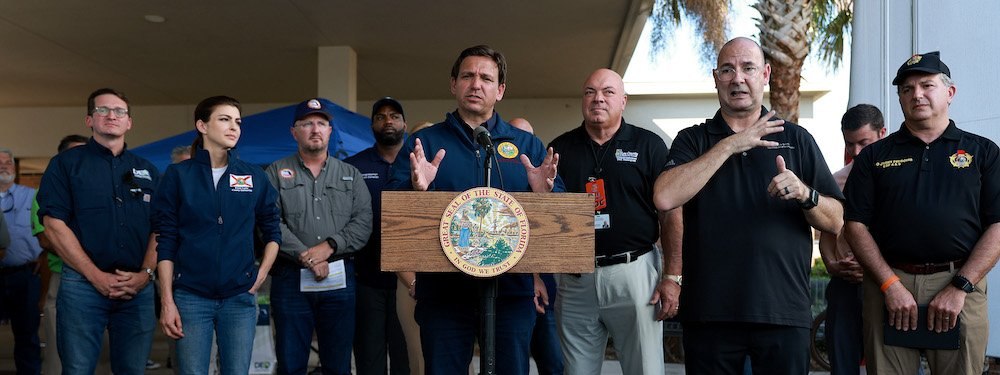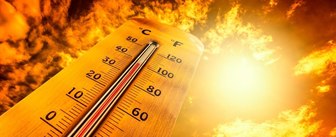Southwest Florida was recently hit with one of the worst storms in the state's history, as Hurricane Ian made landfall roughly a week ago and brought mass destruction and significant loss of life. More than nine in 10 Americans (93%) have heard about Hurricane Ian, according to polling conducted in its wake by The Economist and YouGov.
As of now, most Americans are satisfied with all levels of government response – that of the state government (60% approve) and federal government (55%), as well as the efforts of the Federal Emergency Management Agency (FEMA) (60%) and Florida Governor Ron DeSantis (54%). Members of both parties are more likely to approve than to disapprove of the responses from all levels, though to varying degrees. Democrats are more likely than Republicans to approve of the federal government's response, as well as that of FEMA. Republicans are more likely to approve of the state government's response, including its governor. Overall, 40% of Americans hold a favorable view of DeSantis, while 34% hold an unfavorable view of him.
Half of Americans (51%) believe hurricanes have become more severe in recent years, resulting in more damage and greater loss of life than in the past; only 7% believe they've become less severe. Two in five believe the number of severe hurricanes has increased, while 9% believe the number has decreased. This could be an example of recency bias, a phenomenon where respondents place more importance on more recent events.
Recent extreme weather events have prompted calls for increased attention to the issue of climate change, which researchers believe has contributed to stronger and deadlier storms in recent years. Our latest poll shows that nearly eight in 10 Americans (79%) believe the world's climate is changing, and around half (47%) say they've personally felt the effects of climate change. Americans are divided as to whether recent severe hurricanes are the result of climate change: 41% say they are, while 38% say they are just events that happen from time to time.
Another YouGov poll, fielded shortly after Ian made landfall, finds that 38% of Americans have personally experienced a hurricane or tropical storm, including 59% of people living in the South and 43% of those living in the Northeast. However, only one in five Americans (18%) say they currently live or own property in an area that is generally prone to hurricanes and tropical storms. Around one in three Southerners (32%) say they're in an area prone to such storms.
Among people who say they live in areas prone to hurricanes or tropical storms, 64% say they've experienced property damage as a result of one of these events.
Some research has examined how severe weather alerts impact peoples' responses to such events. Our poll finds that 38% of Americans have been alerted in advance to a potential hurricane or tropical storm in their area, including 59% of people in the South and 51% of people in the Northeast.
While Southerners are more likely than other Americans to have experience with hurricanes or tropical storms, they are only slightly more likely to have an emergency kit prepared with supplies such as water, food, and medicine. Overall, 36% of Americans say they have made such preparations compared to 43% of Southerners.
Severe weather alerts can allow people time to prepare for or evacuate in advance of a storm's arrival. But how are people typically alerted to the impending arrival of a hurricane or tropical storm? Among those who say they've received an alert in the past, 69% say they were warned via a TV or news announcement. Around half (53%) say they received a phone or text message alert, and roughly one in three (36%) say they heard an alert on the radio. Fewer – 13% – say they've heard a siren alerting them to an upcoming storm.
How do Americans react to hurricane or tropical storm alerts? Among those who say they've received alerts about such storms in the past, half (47%) say they always or usually stock up on supplies in response to an alert and nearly one in three (29%) say they usually fortify their homes. Only 14% say they usually evacuate.
How many Americans have experience with evacuation? Nearly one in five American adults (17%) say they've evacuated their home due to severe weather such as a tornado, hurricane, wildfire, or flood. This number rises to 24% among people living in the South.
– Eli Mckown-Dawson, Carl Bialik, and Linley Sanders contributed to this article
Polling by the Economist/YouGov was conducted on October 1 - 4, 2022 among 1,500 U.S. adult citizens. Explore more on the methodology and data for this Economist/YouGov poll. A separate poll cited in this story was conducted on September 29 - October 3, 2022 among 1,000 U.S. adult citizens. Explore more on the methodology and data for this poll.
Image: Getty (Joe Raedle)











